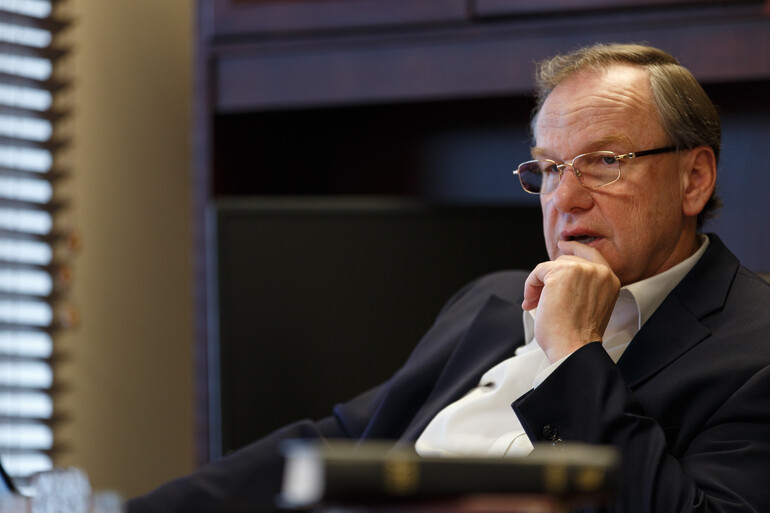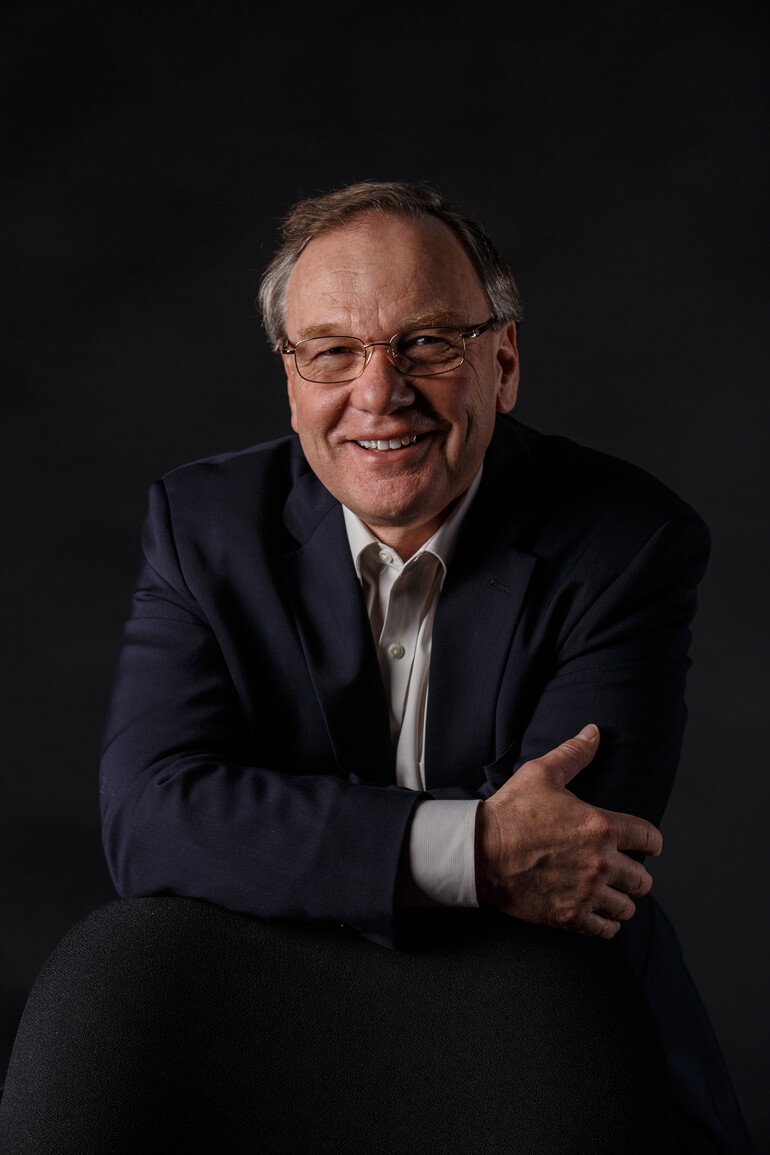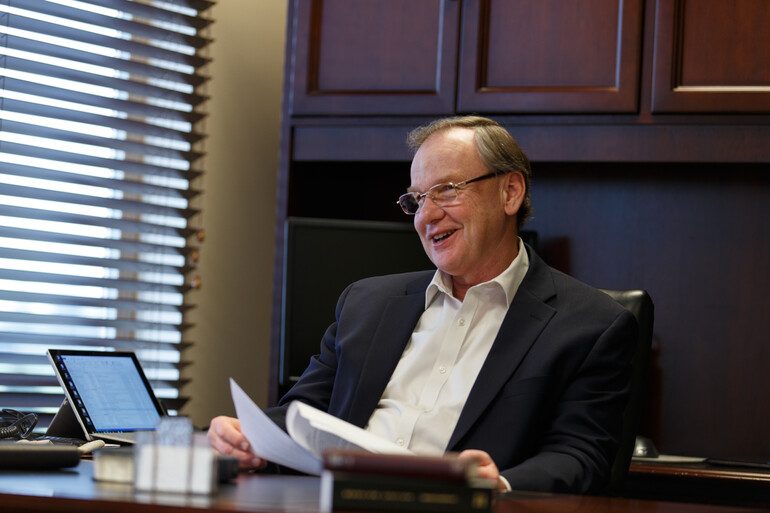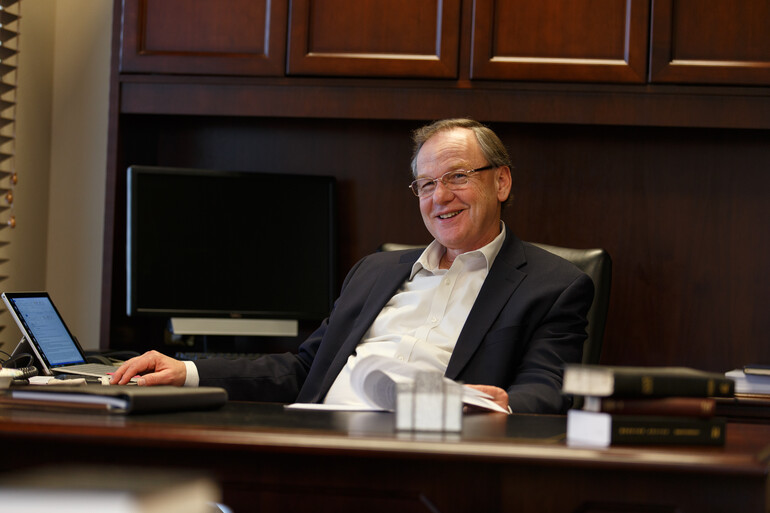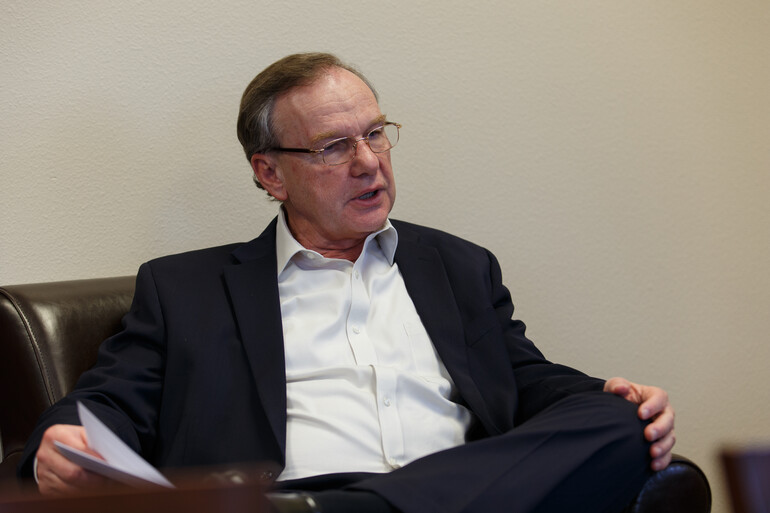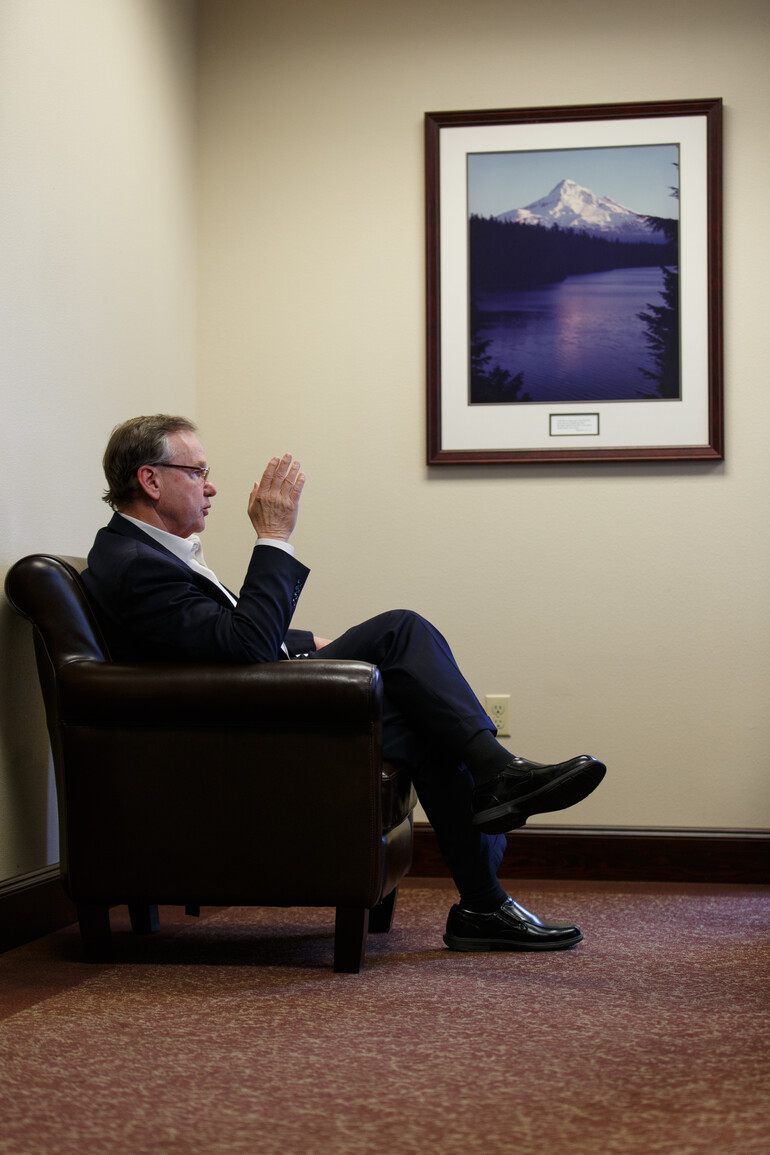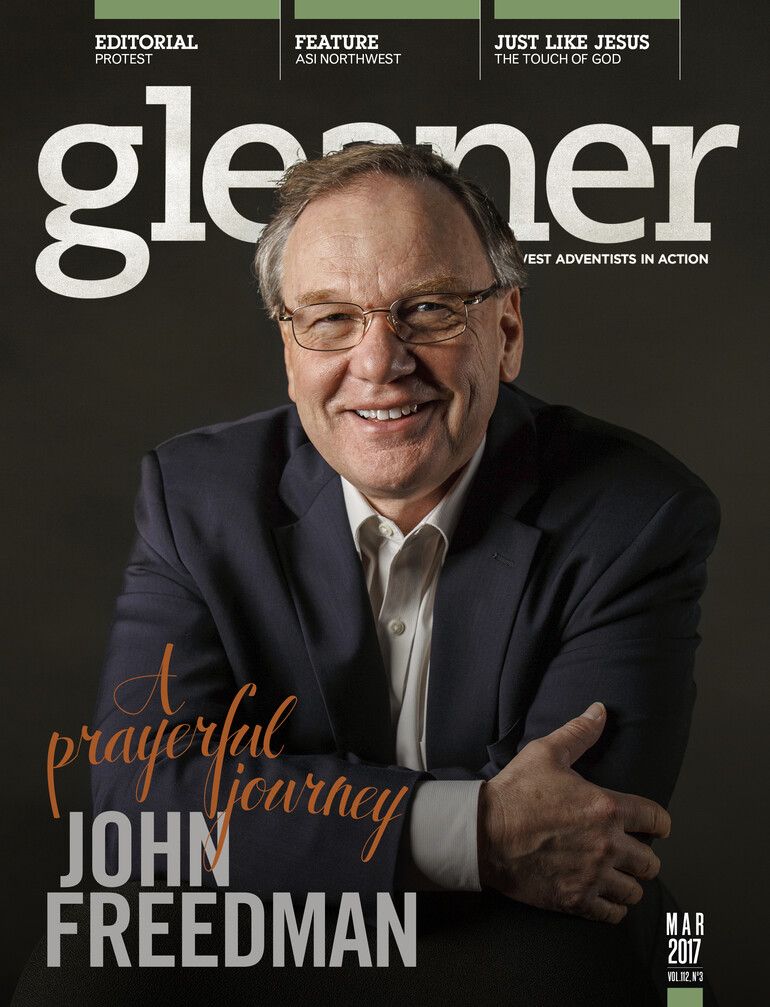John Freedman has been president of the North Pacific Union Conference (NPUC) since September 2016. Since then, world church and division meetings, various committees, holidays, and winter storms have often kept him away from his NPUC desk. He and his wife, Malinda, have not yet been able to relocate locally. So the Gleaner was fortunate to catch him recently for an interview to share some of his personal journey and his hopes for Northwest members.
Were you born into an Adventist family?
Well, it’s an interesting, somewhat complicated story. My Adventist roots go back to my dad’s grandfather, who bought some books from a colporteur. As a result of their reading and studying those books, the whole family became Seventh-day Adventists. My dad was baptized at an early age but joined the Air Force and gradually drifted away from the church. He married an Episcopalian, and when I and my two brothers came along, we weren’t raised to embrace or participate in any particular religion around our home in New Jersey. My grandmother, though, began sending Adventist books and magazines to us. We’d sometimes go with her to church and Sabbath School. But Saturday morning cartoons were tough competition, and there were long periods of time when we didn’t darken the doors of any church.
So you had plenty of “influence” toward Adventist beliefs, but no personal commitment throughout your early and teenage years?
That’s right. When I was about 13, some evangelistic meetings were being held in our area, and my grandmother took my brothers and me to one of the meetings. The speaker got me thinking, and suddenly I was aware of an incredible conviction to publicly accept Christ. My brother David and I went up front in response to the preacher’s call. This was after just one meeting. We didn’t have much background in scriptural teachings. So you can imagine our discomfort when we were put directly into baptismal preparation class. We had no idea how to adequately answer all the prophecy questions to “qualify” for baptism. I remember the teacher throwing up his hands and exclaiming, “You guys shouldn’t even be in this class!” Well, I walked away from that experience and didn’t go back to an Adventist church until I was nearly 20.
What drew you back?
Interestingly enough, when I began attending Rutgers University I started working as a custodian at a large Methodist church nearby. After a while, I also began attending the church. They helped me recommit my life to Christ and encouraged me to become involved in ministry. I asked one of their pastors, “How do you know when you’ve been called to ministry?” He replied, “When you can’t do anything else and be happy.” They saw potential in me, even voting me a full scholarship to Drew University, which had a Methodist seminary attached, with a guaranteed job during and after.
But you were studying business at Rutgers.
Yes, in fact, I had thought of several different areas of interest, including teaching and law. And now, the idea of ministry was stirring inside of me. When I asked my dad, who was not then an active church member, about it, he responded, “How in the world will you make a living with that?” And then he asked, “What about the Sabbath?” Well, that was indeed a twist, coming from someone I’d never seen go to church. But his question caused me to think. I picked up a Bible and began studying it for the first time in my life. I was weighing the generous offers of my Methodist pastors but considering a possible change of direction. I took a leave of absence and went to Colorado to cut trees with my uncle, who happened to be an Adventist. While there, I woke up one morning with an unmistakable conviction that I was fighting God. It was sort of my own personal "Saul on the road to Damascus" experience, and I knew what I had to do.
So how did your new direction go over with your Methodist mentors?
One of the hardest things I’ve ever done was to go back to them and tell them I couldn’t accept their offers. They were truly instrumental in keeping my faith alive and giving me active things to do within the call of spiritual ministry. I am grateful to them and know the Lord worked through them on my behalf.
When did you finally come back full circle to be baptized?
I became a new man in baptism when I was 21. I didn’t know everything about the Bible (and still don’t!), but I followed my convictions. I began going to the little church in New Jersey that my grandmother attended. Soon after, an evangelistic series began, and I encouraged my brothers, who were still close by, to attend. I placed flyers on their beds, on their desks and tables — anywhere I could. I was probably insufferable, but I was excited about my new faith journey and wanted them to experience it too. They went and were baptized! During those meetings I also saw for the first time how the prophetic messages of Scripture provide the connective tissue to our Adventist beliefs. I still believe in the important role of prophecy as we carry out our gospel commission.
You got more from that little church than you originally thought.
That’s right. Not only did Pastor Orville Baer teach me how to give Bible studies, he also had a daughter named Malinda who became an increasingly important part of my life!
Your uncle and aunt were quite instrumental in helping you follow your passion and call to ministry.
Indeed. They helped me to go to the seminary at Andrews University in January 1979. The funny thing was, when I applied, all my pastoral references were from Methodist pastors! You can imagine the questions from the admissions committee. In fact, Bill Johnsson (later Adventist Review editor), who was then at the seminary, called and asked if I was applying to the right school! He and others there were so kind to me, helping me catch up with others who had a lifetime of experience in Scripture. My brother David followed me to the seminary. Both of us were eventually taken on as pastors by Don Schneider, then president of the New Jersey Conference. And, Malinda and I were married in August 1980.
Did you ever reconnect with your Methodist church friends afterwards?
Actually I did go back to thank them for their support and prayers. Amazingly they once again offered me a pastoral position — even after I'd been further grounded in our Adventist beliefs. I was humbled by their invitation and gratified that they saw in me a commitment to Christ and His gospel above all. But my course was already set. God’s call to me was clear. I wanted to be part of sharing this Advent message of a soon-coming Savior, of the gospel woven through Bible prophecy, of the hope we have of a Sabbath rest now and forever. This was and still is my commitment to His call.
You were a pastor for about 17 years before stepping into an administrative role in the Washington Conference. Do you miss being a local church pastor?
Every day. Since my original calling, I’ve been a pastor at heart and always will be. I have to work hard at being an administrator, by reading books and absorbing advice from those more experienced. I guess I approach leadership of a conference or of this union as if I were the pastor of a very large church. But I do miss being an active integral part in a local church family. Leading someone to Christ and watching them confirm the conviction of the Holy Spirit in baptism is one of the most wonderful experiences. One of my great joys as a pastor was baptizing both of my parents and watching them become active, enthusiastic members of our church. To be an effective pastor you’ve got to love people. You've got to take the good and bad. You don’t walk away from people even when things are dysfunctional. Why? Because "love never fails" (1 Cor. 13:8).
After nearly two additional decades in local conference administration, you accepted the NPUC presidency this past fall. What new challenges does this bring?
How we interact in this leadership journey speaks volumes — perhaps even more so than what we actually do. I want both my actions and attitudes to be led by the Holy Spirit. Within my new role here at the NPUC, I’m increasingly mindful that people are watching. They’ll know if I’m kind and understanding or not. They will know if my attitudes conflict with my words or actions. They will know if I’m willing to listen before I speak. They will be watching to see if I use whatever influence I have in this role to help support the core values and principle of God’s kingdom. I’ll pray every day that the Lord will enable me as an administrator to carry a pastor’s heart into every experience I have with varied elements, interests and concerns around our Northwest field.
So what are your priorities and vision for the Adventist work in the Northwest?
During the next several months I plan to visit and listen to stakeholders in every major field within the Northwest. I want to hear from their hearts before we cast a collective vision and focus for Northwest ministry. At some point this year, I hope we can prayerfully embrace some of those ideas for a unified vision through an additional feature in the Gleaner. But every decision and action we eventually endorse must be centered on Christ and the everlasting gospel. My personal priorities are in several areas: establishing a firm spiritual and scriptural foundation to our lives and our work; making the gospel of Jesus Christ and the critical role of the Holy Spirit real in our daily lives; and being mission-minded in the areas of evangelism, Adventist education, and connections with our youth and young adults. Everywhere I go, I hear concerns about how to get every element of our membership, including youth and young adults, involved as full partners in our common mission.
You have stepped into the NPUC role at a complicated time for North American and world church leadership, given the differences we have experienced regarding church unity and governance. How have you addressed the concerns of your Northwest constituents about these issues?
I’m working closely with union presidents from around the North American Division (NAD) and our NAD leadership to determine how we can most effectively support our world church structure. We had a thoughtful meeting with world church leaders on January 19. We hope to draft our vision for a suggested way forward to deal productively with the issues of governance that will be reviewed by the NAD administration and approved by the NAD executive committee before being presented to General Conference officers. These are important steps. Our church is not designed to be run by a few people at any level. It is a collective effort involving the priesthood of all believers in doing God’s will in every corner of our world. I hope we’ll soon be able to move beyond these current concerns so that all of us — male, female, young and old — can fully be about our Father’s business.
Some issues within our church have become mountains that are not central to the gospel or our unique calling as Adventists. With our polarized culture today, how can our members experience true unity in purpose and mission, despite our differences?
Only the Holy Spirit can bring true unity. Ellen White talks about receiving the Holy Spirit through reading the Word, prayer and active gospel ministry. When we are actively out on mission, we become partners with the Holy Spirit. If we’re praying and ministering within and for our communities, we’re busy on the Lord’s mission — too busy to fight over sideline differences. The disciples were all different. What bound them together was Jesus. They had to be converted, but the Holy Spirit brought them into mission together. I believe it's the same today. The only way we'll become united as a group is focusing on Jesus and allowing the Holy Spirit to take possession of our hearts. When our whole desire is to minister to people like Jesus did, our differences will melt away. When we place Him front and center, our disputes will fade into the background. If Jesus is controlling my life, He gives me love for others no matter what they believe. Is it possible to be kind and loving with someone who holds a different opinion than yours? Yes! In fact, we've been commanded by Jesus to "love one another as I have loved you." So, actually, it's not an option.
What are your hopes and dreams for Northwest church members and our collective outreach?
That we’ll find prayerful unity through the Holy Spirit — not uniformity, but unity in our God-given mission empowered by the Holy Spirit. The scriptural injunction in Zechariah 4 reminds us that progress happens, "Not by might nor by power, but by My Spirit." Ellen White challenges us in Steps to Christ to be people of prayer. “We need to … pour out our hearts to Him" she says. "In order to have spiritual life and energy, we must have actual intercourse with the Father.” She goes on to say that prayer “does not bring God down to us, but brings us up to Him.” I firmly believe that lack of prayer causes the death of many of our churches and our disunity. If we could awaken our churches through active, earnest prayer, we would experience revival.
Prayer has indeed been a very important focus for you. What role do you see it playing for our Northwest church?
My personal testimony is one of life transformation. When I really began to understand how the Holy Spirit can transform us from the inside out, when I saw how prayer is integral to that process, something dramatic changed. At one point, I was burned out spiritually as a pastor. A church member came up to me and said, “Your prayers are becoming very stale. Can I pray for you?” Her perception shocked me — that my spiritual dryness was so obvious. I realized I needed to reengage with prayer. I read through all of Ellen White’s comments on prayer and did the same with the Bible and a concordance. It changed my life. I felt like I went through a second conversion experience. I preached on prayer for one solid year, and it has remained a central focus in my life. Prayer changes people. It changed me. So for us as Northwest members … I believe we are all on common ground when we kneel at the foot of cross — and prayer brings us there. It’s hard to be full of pride on your knees. In fact, it's pride that keeps us from getting on our knees for prayer. Our divisions are often spiritual issues. We need God’s wisdom. If we lack wisdom, James tells us to ask God for it. We need humble leaders, people of prayer to lead us through some of these issues. God will work in answer to prayer in ways He could not or would not without prayer. It is not an optional exercise for me, and I don't believe it should be so for us as God’s church.




